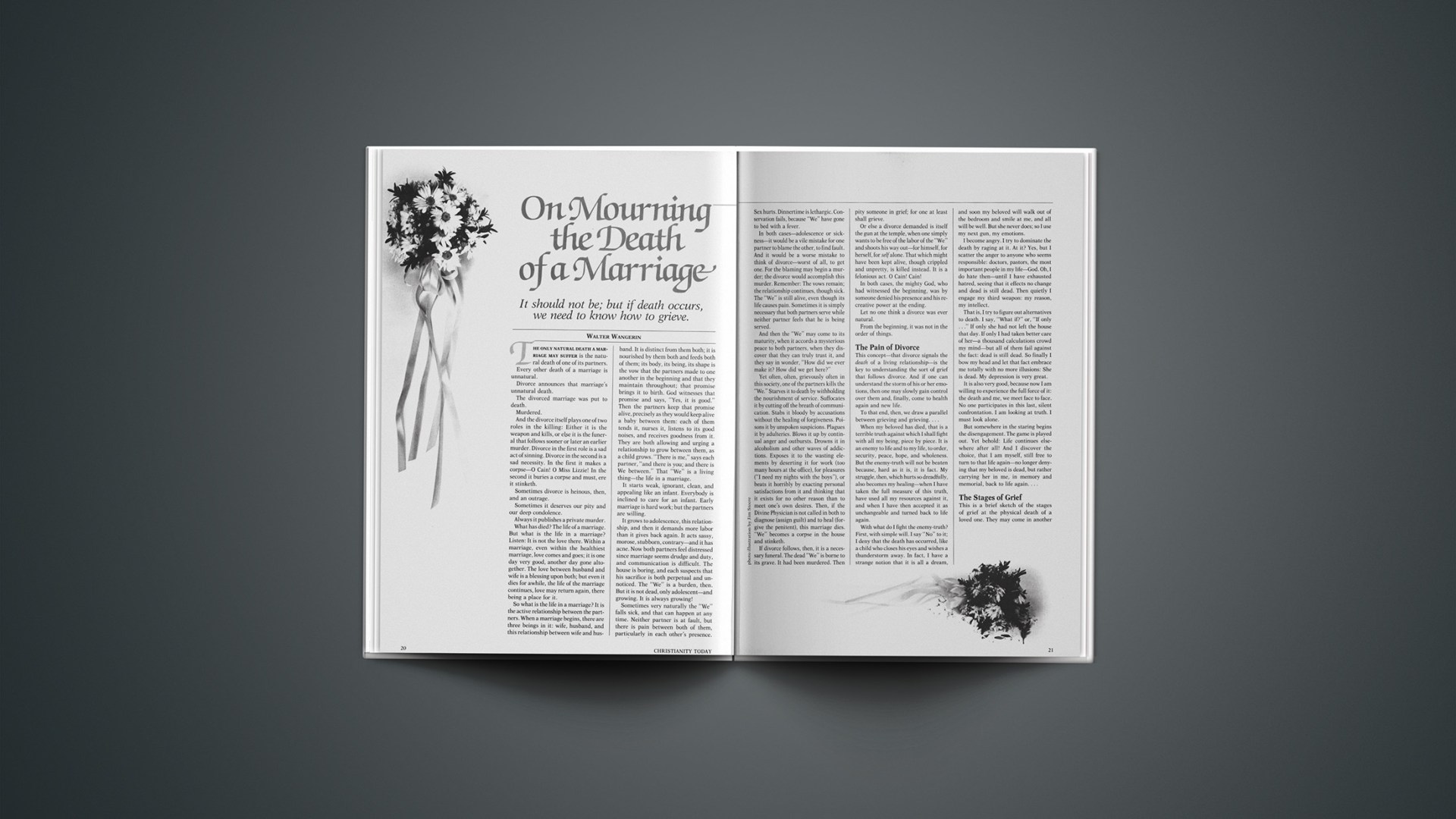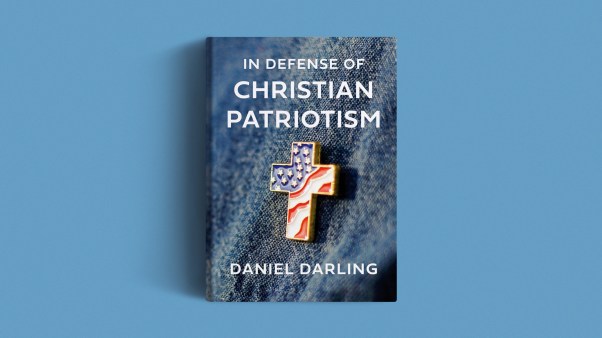The only natural death a marriage may suffer is the natural death of one of its partners.
Every other death of a marriage is unnatural.
Divorce announces that marriage’s unnatural death.
The divorced marriage was put to death.
Murdered.
And the divorce itself plays one of two roles in the killing: Either it is the weapon and kills, or else it is the funeral that follows sooner or later an earlier murder. Divorce in the first role is a sad act of sinning. Divorce in the second is a sad necessity. In the first it makes a corpse—O Cain! O Miss Lizzie! In the second it buries a corpse and must, ere it stinketh.
Sometimes divorce is heinous, then, and an outrage.
Sometimes it deserves our pity and our deep condolence.
Always it publishes a private murder.
What has died? The life of a marriage. But what is the life in a marriage? Listen: It is not the love there. Within a marriage, even within the healthiest marriage, love comes and goes; it is one day very good, another day gone altogether. The love between husband and wife is a blessing upon both; but even it dies for awhile, the life of the marriage continues, love may return again, there being a place for it.
So what is the life in a marriage? It is the active relationship between the partners. When a marriage begins, there are three beings in it: wife, husband, and this relationship between wife and husband. It is distinct from them both; it is nourished by them both and feeds both of them; its body, its being, its shape is the vow that the partners made to one another in the beginning and that they maintain throughout; that promise brings it to birth. God witnesses that promise and says, “Yes, it is good.” Then the partners keep that promise alive, precisely as they would keep alive a baby between them: each of them tends it, nurses it, listens to its good noises, and receives goodness from it. They are both allowing and urging a relationship to grow between them, as a child grows. “There is me,” says each partner, “and there is you; and there is We between.” That “We” is a living thing—the life in a marriage.
It starts weak, ignorant, clean, and appealing like an infant. Everybody is inclined to care for an infant. Early marriage is hard work; but the partners are willing.
It grows to adolescence, this relationship, and then it demands more labor than it gives back again. It acts sassy, morose, stubborn, contrary—and it has acne. Now both partners feel distressed since marriage seems drudge and duty, and communication is difficult. The house is boring, and each suspects that his sacrifice is both perpetual and unnoticed. The “We” is a burden, then. But it is not dead, only adolescent—and growing. It is always growing!
Sometimes very naturally the “We” falls sick, and that can happen at any time. Neither partner is at fault, but there is pain between both of them, particularly in each other’s presence. Sex hurts. Dinnertime is lethargic. Conservation fails, because “We” have gone to bed with a fever.
In both cases—adolescence or sickness—it would be a vile mistake for one partner to blame the other, to find fault. And it would be a worse mistake to think of divorce—worst of all, to get one. For the blaming may begin a murder; the divorce would accomplish this murder. Remember: The vows remain; the relationship continues, though sick. The “We” is still alive, even though its life causes pain. Sometimes it is simply necessary that both partners serve while neither partner feels that he is being served.
And then the “We” may come to its maturity, when it accords a mysterious peace to both partners, when they discover that they can truly trust it, and they say in wonder, “How did we ever make it? How did we get here?”
Yet often, often, grievously often in this society, one of the partners kills the “We.” Starves it to death by withholding the nourishment of service. Suffocates it by cutting off the breath of communication. Stabs it bloody by accusations without the healing of forgiveness. Poisons it by unspoken suspicions. Plagues it by adulteries. Blows it up by continual anger and outbursts. Drowns it in alcoholism and other waves of addictions. Exposes it to the wasting elements by deserting it for work (too many hours at the office), for pleasures (“I need my nights with the boys”), or beats it horribly by exacting personal satisfactions from it and thinking that it exists for no other reason than to meet one’s own desires. Then, if the Divine Physician is not called in both to diagnose (assign guilt) and to heal (forgive the penitent), this marriage dies. “We” becomes a corpse in the house and stinketh.
If divorce follows, then, it is a necessary funeral. The dead “We” is borne to its grave. It had been murdered. Then pity someone in grief; for one at least shall grieve.
Or else a divorce demanded is itself the gun at the temple, when one simply wants to be free of the labor of the “We” and shoots his way out—for himself, for herself, for self alone. That which might have been kept alive, though crippled and unpretty, is killed instead. It is a felonious act. O Cain! Cain!
In both cases, the mighty God, who had witnessed the beginning, was by someone denied his presence and his recreative power at the ending.
Let no one think a divorce was ever natural.
From the beginning, it was not in the order of things.
The Pain Of Divorce
This concept—that divorce signals the death of a living relationship—is the key to understanding the sort of grief that follows divorce. And if one can understand the storm of his or her emotions, then one may slowly gain control over them and, finally, come to health again and new life.
To that end, then, we draw a parallel between grieving and grieving.…
When my beloved has died, that is a terrible truth against which I shall fight with all my being, piece by piece. It is an enemy to life and to my life, to order, security, peace, hope, and wholeness. But the enemy-truth will not be beaten because, hard as it is, it is fact. My struggle, then, which hurts so dreadfully, also becomes my healing—when I have taken the full measure of this truth, have used all my resources against it, and when I have then accepted it as unchangeable and turned back to life again.
With what do I fight the enemy-truth? First, with simple will. I say “No” to it; I deny that the death has occurred, like a child who closes his eyes and wishes a thunderstorm away. In fact, I have a strange notion that it is all a dream, and soon my beloved will walk out of the bedroom and smile at me, and all will be well. But she never does; so I use my next gun, my emotions.
I become angry. I try to dominate the death by raging at it. At it? Yes, but I scatter the anger to anyone who seems responsible: doctors, pastors, the most important people in my life—God. Oh, I do hate then—until I have exhausted hatred, seeing that it effects no change and dead is still dead. Then quietly I engage my third weapon: my reason, my intellect.
That is, I try to figure out alternatives to death. I say, “What if?” or, “If only.…” If only she had not left the house that day. If only I had taken better care of her—a thousand calculations crowd my mind—but all of them fail against the fact: dead is still dead. So finally I bow my head and let that fact embrace me totally with no more illusions: She is dead. My depression is very great.
It is also very good, because now I am willing to experience the full force of it: the death and me, we meet face to face. No one participates in this last, silent confrontation. I am looking at truth. I must look alone.
But somewhere in the staring begins the disengagement. The game is played out. Yet behold: Life continues elsewhere after all! And I discover the choice, that I am myself, still free to turn to that life again—no longer denying that my beloved is dead, but rather carrying her in me, in memory and memorial, back to life again.…
The Stages Of Grief
This is a brief sketch of the stages of grief at the physical death of a loved one. They may come in another sequence; some may be skipped. And throughout it all, prayer occurs in a variety of forms. My sketch is incomplete. But it can serve as the pattern of grief at the death of a marriage, for the same stages happen. In both cases the stages are painful; but in both cases they are, in fact, the healing of the heart in struggle against hard fact.
If one does not stall on one or the other stage, they are good.
• Denial. How often the divorcé, even long after the fact and against all evidence, dreams that the evil did not occur, that something, something still remains of the relationship (remember the good old days?) and struggles to recapture what simply does not exist. Here is a man, for example, who continually harasses his ex-wife—by telephone, letters, confrontations—who does not hear the real threat in his own voice, even while he is claiming love for her, and is bewildered by the fear in her. This man is suffering. Here is a woman whose irrational urge it is to return again and again (either in imagination or in fact) to a situation that again and again destroys both people. Or they dream constantly of one another, or can talk of nothing else. Now, if there is some life left in the relationship, good. Work at it. Work hard. But if none of that work is ever effective, and if sin persists in killing the soul, then this urge may be simply a willful “Yes” to the hard truth.
Oddly, sadly, the divorcés will each progress at different rates through the stages and soon will not understand where the other is coming from.
• Anger. Moments of rage will arise, hatred so strong that it will frighten friends, children, and the divorcé himself, herself. Note: these periods must be allowed in order to be passed through. I’m afraid they are necessary—and good, if they are properly directed. Direct them at the divorce, at the situation, for that is the truth to be met and accepted. On the other hand, they are dangerous if they are directed at the ex (for then we have threat and vengeance, and no healing) or else at the self (for then we have a debilitating guilt, and no healing). Or direct them at God, in prayer. He is great and will not be wounded by our petty noises; but he can change us. And if we place our hatreds in front of him, we give him the opportunity to quiet them, forgive them, and to put them away forever.
The anger, like a volcano, if expressed and not repressed, can finally run its course—a useless gun against the fact. The tears can turn from bitterness to simple sadness. And the struggle turns to—
• Bargaining. A strange and nearly comical stage. The intellect restlessly seeks alternatives to a terrible fact. And that manifests itself by the divorcée “what-if-ing” alternative lifestyles, habits he or she never had before. So here comes a middle-aged man in long hair and beads, playing the role of the young. Or here is a woman suddenly giddy, laughing too loudly, tossing hugs at people like a little girl. Or someone who had always been reserved wanting to engage in long, revealing conversations. Shocking changes—they will pass. They are the testing of style that might have—they think—made a difference.
Or, during this stage, the past is studied again and again: “What went wrong?”—with urgent and frustrating futility. And friends suffer the patent uselessness of the exercise. But it must be. Questions, not answers, must be.
• Depression. Everything seems to stop. Social relationships and friendships stop. Plans and commitments stop. Religious activity stops. Bodily cleanliness, proper meals, housecleaning, even physical motion, all slow and stop. It is, to friends, a scary time: the divorcée seems to have dropped out to nothingness.
Ah, but it is internally a busy, busy time—facing that fact clearly and alone. And friends should hold the peace awhile and allow it. Come, sit, if you must—but don’t force conversation; be quiet. Make a meal; but don’t demand it be eaten; leave it. Pray, and watch for the tiniest signs of life (she made her bed this morning!), and then encourage these—gently. Be there to see the signs, then don’t do them for the other; simply say you noticed. For then the game shall be played out. Then, finally, is found the freedom, again to be and to be alive.
How, Then, To Wholeness?
But the grieving of the divorcée is also different and more difficult than other grieving.
Three questions:
Where do you go to mourn the death that hath no body?
How can community comfort the grieving with neither a funeral nor an interment?
How can the tooth of hatred or resentment be extracted when this particular death cannot be called an “act of God,” “accidental,” or “fated” but the culpable acts of those most near and once most trusted?
Three questions, hard and hopeful. Hard because they identify the peculiar sufferings of the divorcé, whose marriage is the thing deceased. If it had been the spouse, these questions wouldn’t exist. Hopeful because the answering of them can finally lead that divorcé back to living again, and to life.
You think you’ll hurt forever, nor ever trust again.
But you won’t. And you do.
Divorce is a death without a corpse. For any other death there is granted the terrible moment of seeing with thine own eyes the cold clay of the beloved. And though that sight cuts to the heart, and though one bleeds tears to see it, yet the heart is thereby convinced: It is done. There is no more denying it. Your beloved is irretrievably gone. And the tears are your sad “Yes” to the facts. Thou art convinced.
Go lay flowers on the grave. Such viewing triggers the God-given processes of healing and the soul’s wholeness once again.
But when that moment is not granted, the divorcé wants it and seeks it anyway.
First, as mistaken and futile as it is, he tries to pronounce his ex dead, nonexistent. He fights to know nothing of her present state, changes, circumstances, job, relationships, so that the last time he saw her becomes the last time she was. The less he knows, the more dead she is, and that last sight yellows to cadaver. It doesn’t work. She returns—in dreams, in needs (child support), in the minds of those who continue to know them both, and in the flesh since the decisions of divorce extend long, long into the divorcé’s later life. And children preserve the union in their very beings, though the union itself be dissolved.
Or second, she tries to make of her own body the corpse, a hollow and unfeeling thing, ugly, decaying, unkept, and worthy of nothing so much as a burial. She desires friends to grieve for her own death, a morbid, unsettling request. She blames her accidental laughter, and hates it that she has to eat. She truly sickens. But this corpse is dangerous and sinful and false. She has not died.
What then? Then make a self-conscious ritual of burying the marriage. That’s what is dead. You hesitate long to do this because of its pain, because no one forces you to it. Or you do it passionately, in ineffectual fits and starts. Let some inanimate thing symbolize the marriage, something important to you because of the marriage, and dispose of it. And know what you are doing. Instead of grabbing all you can in settlement, pack up the dear and the memorable: letters, to be sure; but dishes, too, and jewelry, furniture, clothing, the house itself (you know what was significant to you), and gently—not furiously!—be rid of it. You do not do this to hurt the other nor to release anger, but to experience the marriage dead. And you shall suffer at the loss; and you may scrape because of it; but these are the feelings that talk to the soul. It always hurts to stand before the casket.
It is not strange that the divorcing couple (unknowingly) tries to make of the court appearance a funeral—the participating ceremony of the community, some public support for them in their hour of need. They hunger that as much as does the widow. But it doesn’t satisfy. The judge, unlike a pastor, cares rather for the law than for either one of them. The lawyers are retained for a fee, not present for condolence. The audience are either voyeurs or people involved in following cases, cold and careless.
Therefore, to the friends of the divorcé I speak. Despite your natural ignorance of the language and procedure (we were never taught what to do at this sort of death), please don’t let the change in your friend’s life change your friendship. He’ll expect such change, since he’s changed so much. Your continuance will be a graceful surprise. On the other hand, friendship is elastic and will not pretend that nothing has happened. Your silence alone, your sitting with the bereaved (a wake!) can acknowledge the crisis occurring. You will not force him to stupid jolliness or to parties as of old, or else you signal your own need not to have your life disrupted. And for heaven’s sake, you will not indulge in blaming the other while you exonerate your friend; that is tantamount to killing the corpse again and again. It fires the sin. It is no help.
There will come the time, after the divorce is final, when you will, with your friend’s willingness, give a “Dinner of the Changes” (that’s formal)—or more informally, when a special self-conscious conversation will become the “Speaking of the Changes.” Here a handful of the understanding will speak aloud and in detail their recognition that something has, in fact, ended, and another can, by grace, begin. You can be very specific in describing what is past. For the future, you can together bow your heads and pray (aloud) for the power of the creating God to make newness in this one’s life (read Psalms 130; 116; 103, in that order), then promise your own willing participation in the changes to come, and then keep your promise.
Finally, thou divorcée, know there is only one enemy in all the world who is worthy of your hatred. This enemy used your spouse and you together for evil. This enemy seeks destruction and so is the prime cause of your situation, the divorce. Therefore, hate the situation. And hate him who hates you and your ex together. Hate Satan. When you’ve found the right object for your attack and condemnation (the one who tempted and enthralled the people you know), then you will be free to discourse again with these people and with your ex. Then you shall not be crippled by a restless blaming and rehearsing of the past, but whole and able to turn to life again.
Tim Stafford is a free-lance writer living in Santa Rosa, California. He is a distinguished contributor to several magazines. His latest book is Do You Sometimes Feel Like a Nobody? (Zondervan, 1980).










